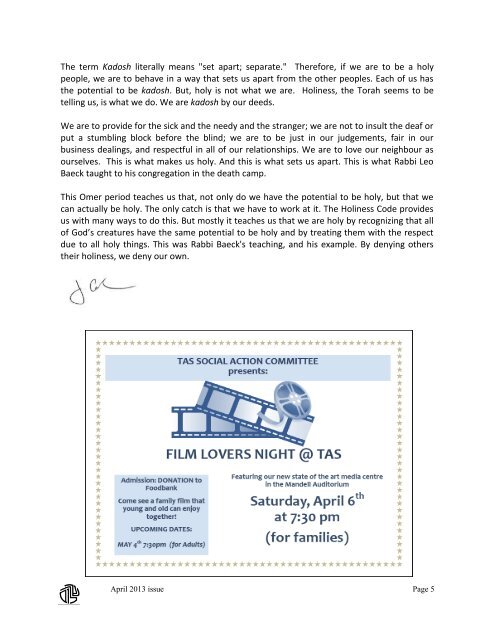You also want an ePaper? Increase the reach of your titles
YUMPU automatically turns print PDFs into web optimized ePapers that Google loves.
The term Kadosh literally means "set apart; separ<strong>at</strong>e." Therefore, if we are to be a holy<br />
people, we are to behave in a way th<strong>at</strong> sets us apart from the other peoples. Each of us has<br />
the potential to be kadosh. But, holy is not wh<strong>at</strong> we are. Holiness, the Torah seems to be<br />
telling us, is wh<strong>at</strong> we do. We are kadosh by our deeds.<br />
We are to provide for the sick and the needy and the stranger; we are not to insult the deaf or<br />
put a stumbling block before the blind; we are to be just in our judgements, fair in our<br />
business dealings, and respectful in all of our rel<strong>at</strong>ionships. We are to love our neighbour as<br />
ourselves. This is wh<strong>at</strong> makes us holy. And this is wh<strong>at</strong> sets us apart. This is wh<strong>at</strong> Rabbi Leo<br />
Baeck taught to his congreg<strong>at</strong>ion in the de<strong>at</strong>h camp.<br />
This Omer period teaches us th<strong>at</strong>, not only do we have the potential to be holy, but th<strong>at</strong> we<br />
can actually be holy. The only c<strong>at</strong>ch is th<strong>at</strong> we have to work <strong>at</strong> it. The Holiness Code provides<br />
us with many ways to do this. But mostly it teaches us th<strong>at</strong> we are holy by recognizing th<strong>at</strong> all<br />
of God’s cre<strong>at</strong>ures have the same potential to be holy and by tre<strong>at</strong>ing them with the respect<br />
due to all holy things. This was Rabbi Baeck's teaching, and his example. By denying others<br />
their holiness, we deny our own.<br />
April 2013 issue Page 5


